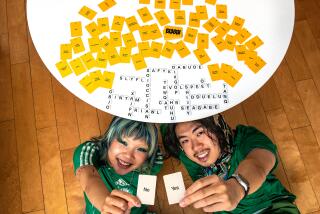Alfred Butts; Architect Created Game of Scrabble
- Share via
Alfred Mosher Butts, an architect who created the durable board game Scrabble, which he dubbed simply “It” six decades ago, has died. He was 93.
Butts died Sunday at a hospital in his hometown of Rhinebeck, N.Y.
“I invented the dern game and what happened is still crazy to me,” the feisty Butts, mystified by the scale of national Scrabble tournaments and annual sales of 1.5 million sets, said when the game celebrated its 50th anniversary in 1981. “I don’t even know why it’s called Scrabble, to tell you the truth.”
He graduated from the University of Pennsylvania with a degree in architecture in 1924 and went to work for the New York firm of Holden, McLaughlin & Associates. Butts designed many New York housing projects, received patents for several architectural structural systems and was an accomplished artist. New York’s Metropolitan Museum of Art purchased six of his drawings.
But during the Depression there was little work available, and Butts, eager to put some bread on the table, turned his attention to games. A poor speller but an enthusiastic fan of anagrams, he set out to devise a system of scoring them. He studied the front page of the New York Times for a week, charting the distribution of letters in words and arbitrarily assigning values from 1 to 10.
He first referred to the game as “It” and later called it “Lexico.” The game, with 98 letter tiles and two blank tiles, originally sold for $1.50 and was played by discarding and picking up, as in cards, until a word was formed. By 1938, crossword puzzles had given Butts the idea of adding a game board. He then renamed the game “Criss-Cross Words.”
He was unable to sell it, Butts said, because all the companies he approached “wanted childish games and rejected it without ever playing it.” So he made 500 copies for his friends and went to work for the New York City Housing Authority.
But when James Brunot, retired director of the War Relief Control Board, encountered the game, he struck a deal with Butts in 1948 to manufacture it and pay Butts a royalty. It was Brunot who gave the game its popular name, Scrabble, pulling the tag out of thin air largely because it was a name that had never been copyrighted.
Brunot’s manufacturing operation--based in his living room--lost money for three years. But strangely, in late 1952, orders jumped from 16 to 411 a day. Writers at the time credited the “exceptionally active mouths” of the women of Smith College, where the game had been advertised. A Macy’s executive enchanted with the game also began selling it at what was then the world’s largest store.
Douglas Bolton, a young executive with Chicago’s Cadaco-Ellis Co., plied his boss with wine and a spirited game of Scrabble until he persuaded her to take a chance on it. That company sold 1 million copies of Scrabble in the first 11 months of 1954, paying Brunot $100,000 and Butts $20,000 out of the $900,000 gross.
Eventually, Selchow & Righter, a Long Island, N.Y., company that had rejected the game when Butts first presented it in the 1930s, got interested. The company took over manufacturing and marketing rights in late 1954, and it paid royalties to Butts and Brunot until buying the game in 1972. The company claims that the game, played in English, German, Italian, Spanish, French, Russian, Hebrew, Braille and a Hollywood dirty words edition, regularly outsells another popular board game, Monopoly.
Did the invention make Butts a millionaire? “No,” he said in 1981. “Brunot made out much better than I. The public relations people tell me I should say it allowed me to live ‘comfortably.’ ”
More to Read
The biggest entertainment stories
Get our big stories about Hollywood, film, television, music, arts, culture and more right in your inbox as soon as they publish.
You may occasionally receive promotional content from the Los Angeles Times.










